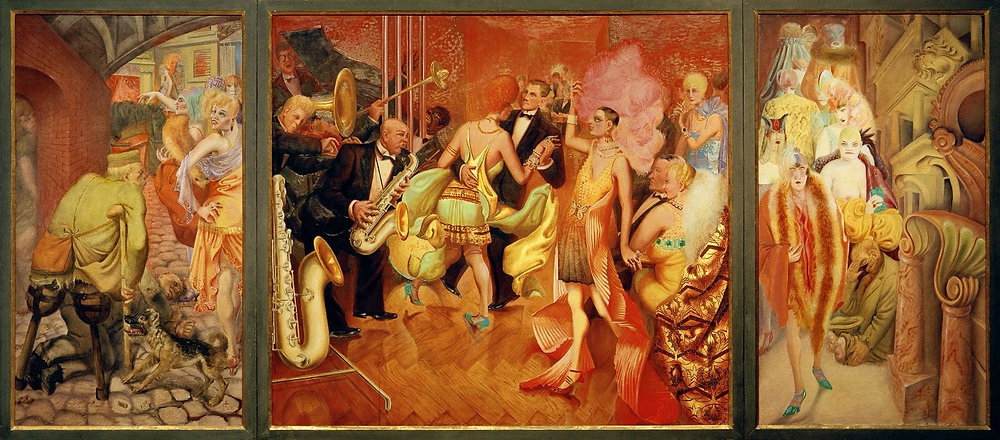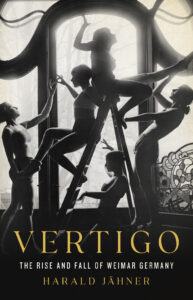
How the Weimar Republic’s Hyperinflation Transformed Gender Relations in Germany
Harald Jähner on the Economic, Social and Moral Landscape of Weimar Berlin
One of the social dividends of post-war inflation in Weimar Germany was greater independence for women. It’s no coincidence that the locus for this was on the dance floor. The dance-hall clientele now included a type of customer who had never been seen before: unaccompanied women. Most of these were young shorthand typists and secretaries who visited the clubs alone or with girlfriends. To the puzzled observer from more conservative circles, or indeed from the provinces, this type of behavior was unheard of, and seemed dangerously close to prostitution.
Many girls came from the provinces to Berlin, eager to breathe the balmy air of freedom. If, as often happened, they didn’t find a regular income as quickly as they might have wished, they at least wanted, like the famous “artificial silk girl” in the novel of the same name (Das kunstseidene Mädchen in German) by Irmgard Keun, to enjoy some kind of night-life glamour, and act like proud, independent women who “are their own environment” and can switch themselves on “like electric light-bulbs, and no one can get at them through the beam.”
During hyperinflation, there was effectively no aspect of life in which money didn’t play an important part.
Certainly, money played a part in the style with which young women conquered the city’s nightlife. During hyperinflation, there was effectively no aspect of life in which money didn’t play an important part. Many of these women could more or less find their feet thanks to their new office jobs. But the ones who didn’t have that kind of independence in mind, and who instead had their eyes set on marriage, had their plans scuppered by hyperinflation, which had ruined the dowry system. From rich family’s elder daughter to simple housemaid, some kind of dowry was seen as an economic requirement for marriageability. Even many single housemaids had set aside everything they could in order to increase their chances on the marriage market.
Now those savings were basically liquidated. The prospect of marriage wasn’t completely ruled out—sometimes love outshone the bride’s lack of means—but it had become more unlikely. Many young women saw themselves thrown back on their own devices, forced to recognize a potential for emancipation in the loss of their dowries. They took control of their own fortune, and played an active and independent part in the search for a partner. Without a dowry, parents had no say in the matter. The idea associated with the dowry that one was supposed to “save oneself ” for the wedding night was further battered by hyperinflation. Once again the same principle applied: saving is pointless. Don’t think of tomorrow, all that matters is today.
Just as hyperinflation accelerated all social trends in swirling counter-currents of fresh liberation and new constraints, it also gave an almost explosive boost to female emancipation. Tough and athletic, quick-witted and sparklingly intelligent, the “new woman” became a new social role model. Starting with the very highest social strata, where the fashionable attributes of tennis playing, car driving and writing counted for a lot, the rebellious daughters fought their way downwards. Praised and photographed a thousand times over in the illustrated magazines, the “new woman” also impressed the girls who had to earn their money at typewriters in the cities, and in many respects created a hypermodern type of woman pointing far into the future, who found her goal in self-determination.
One of the more regrettable aspects of inflation was the rise of prostitution. It had nothing to do with emancipation but was ideally placed to bring the notion into disrepute. Sudden poverty forced even upper-class women on to the street. “Now only amateurs practice prostitution, and in broad daylight,” Egon Erwin Kisch wrote from Berlin in August 1923:
When I was leaving the café yesterday, a woman addressed me and told me that her husband was an interior designer, but that he had had no commissions and was ill. Could I go with her? I hadn’t even answered when a girl stepped between us and tried to push the woman away. ‘I have fabulous hair and a beautiful body…’
There was an abundance of information on prostitution in the years of inflation, including tips and travel guides. Today, in Mel Gordon’s Voluptuous Panic: The Erotic World of Weimar Berlin, one can read about which Berlin street offered which kind of prostitutes, from minors to pregnant women to the disabled. How much of this was factually accurate and how much was lewd and voyeuristic exaggeration—widespread even at the time—is hard to tell.
Prostitutes acted as a handy real-life metaphor to contemporaries who were inclined, understandably enough, to see inflation as a moral decay in every respect. Left and right outdid one another in their scorn for a society that they saw as selling itself. Prostitutes can hardly have been painted as frequently in any age as they were in the interwar years, usually in a shockingly ugly way. They strut like greedy seagulls through the paintings of Otto Dix and George Grosz—overweight coquettes in the company of paunchy provincials. Others, cat-eyed and sharp-clawed, snuggle up to their black-tie-and-tailed patrons, playing the role of vulnerability.
In the watercolors of the painter Jeanne Mammen, sarcastic gold-diggers eye the dancefloor in search of prey. Ferrety and pig-headed faces can be seen in Elfriede Lohse-Wächtler’s pub paintings. These pictures contained a great deal of social criticism, a love–hate feeling for ugliness, but there was also a subliminal current of contempt for the Republic, particularly in the work of George Grosz, a mixture of arrogance and revulsion, a degree of disappointed idealism, but also a secret fascination with the perverse dressed up as critique. The bad ones were always other people. Everyone else was just looking.
The prostitute became an essential part of the scene in the 1920s; many people saw her as the face that lay behind the seductive mask of the “new woman.” In Alfred Döblin’s novel Berlin Alexanderplatz or Fritz Lang’s film Metropolis, as the Great Whore of Babylon, she became the incarnation of the city, the symbol of a capitalism that had ended up in the moral gutter.
In endless columns of now absurd zeros, Germany seemed to be hurtling towards the end like an out-of-control steam engine.
In his 1931 Moral History of Inflation, Hans Ostwald, a tireless observer of Berlin nightlife, assembled a series of set-pieces to form an image of the decadent 1920s. He described how, evening after evening, nocturnal strollers met up in the station waiting room of Berlin’s Bahnhof Zoo—caught off guard by the closing time, they still wanted to spend the rest of the evening in the stylish way it had begun:
In lace and silk dresses, fur coats and tuxedos, the party crowd sat among the few weary travellers who didn’t have enough money to spend the night in a hotel bed. The others, guests from Dollarica, the Dutch land of the Guilder, Russian émigrées dripping with jewellery, mingled stars from stage and screen, beside cheeky young inflation profiteers, banking apprentices and dollar spivs. Nearby, the heavily made-up dregs of the street jostled, most of them underage girls. It produced a noisy, shrieking image that had never been seen before in Berlin, and which has luckily disappeared again since.
Does this “deeply intertwined confusion of avarice, playfulness, lust for life and superficial pleasure” not recall the pictures of nightlife painted by Otto Dix and Gorge Grosz? And as if to emphasize the similarity with Dix, the cripple who is an inevitable part of the stereotype appears when Hans Ostwald continues:
While the party raged under the railway arch, the war-wounded stood outside in the street offering matches or shoelaces for sale. Miserable street-corner tarts strolled around, unable to make enough to get them through the next day even by giving up their own bodies.
The revulsion that many Germans felt at the sight of this tumultuous nightlife and partygoing had also to do with the dubious power of foreign currencies. For the British, the Americans or the French, Germany became a discount sale for prostitution. Some people came specially for the nightlife, particularly Americans tired of the strict rules of prohibition at home. Others bought their cut-price pleasure as an afterthought once they had done their business deals during the day.
Germany was on sale in every respect—or that was what many shocked observers thought. Whole hordes of foreign shoppers came to buy up goods and take them away on a grand scale. Under the heading “German export trade,” the Berlin Vossische Zeitung—in October 1923 it was 5 million marks a copy—published two pages of small ads directed at foreign importers, sorted alphabetically by products, from A for Abziehbilder (stickers) to Z for Zeitschaltuhren (timers).
In the city center alone, foreigners who could afford at best a two-room apartment on the outskirts of town became billionaires when they stepped off the train at Berlin’s Anhalter Station and rented whole suites at the Excelsior Hotel. Newspapers published shocking depictions of their luxurious lives—”glitzy parties, feasts, masquerades, balls, dance parties,” at which the lady guests ostentatiously displayed their cheaply purchased pearls and furs.
The Viennese journalist Alfred Polgar, head of the features section of the left-liberal newspaper Der neue Tag, reported from Berlin on the foreigners’ bad behavior, including an American in the dining room of a luxury Berlin hotel practicing his habit of whisking egg whites at a provocatively high volume: “For ten or twenty minutes his spoon strikes the plate. The room shakes with the noise. And the pallid locals keep their heads down. It’s as if the noise of victory is roaring above their heads.” Humiliated, journalists wrote about how the foreigners gorged themselves at copiously laden tables, got drunk on the most expensive champagne and then availed themselves of the newly unemployed shorthand typists, now known as “currency girls.”
The maelstrom of devaluation seemed to drag down with it everything that had once been cherished and expensive: loyalty and faith, morals, dowries, innocence, honor—it all disappeared down the drain of time. In an ecstatic trance, wildly shaking to the shimmy, in endless columns of now absurd zeros, Germany seemed to be hurtling towards the end like an out-of-control steam engine.
And then it juddered suddenly to a halt.
__________________________________

Excerpted from Vertigo: The Rise and Fall of Weimar Germany by Harald Jähner. Translation by Shaun Whiteside. Copyright © 2024. Available from Basic Books, an imprint of Hachette Book Group, Inc.
Harald Jähner
Harald Jähner is a cultural journalist and former editor of the Berliner Zeitung. He was also an honorary professor of cultural journalism at the Berlin University of the Arts. His book Aftermath: Life in the Fallout of the Third Reich was shortlisted for the Cundill History Prize and the Baillie Gifford Prize for Non-Fiction. He lives in Germany.












